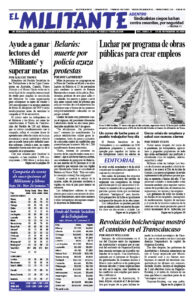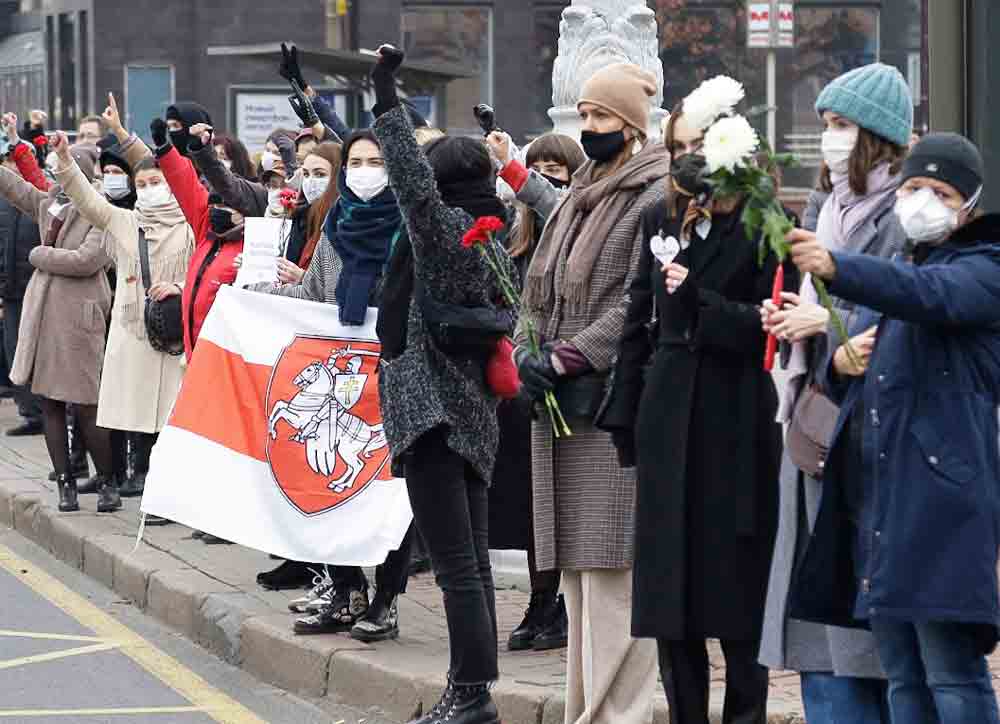Thousands gathered at Minsk’s Square of Change and elsewhere across Belarus Nov. 15 to demonstrate against the cop killing of Roman Bondarenko. He had been one of the hundreds of thousands protesting the regime of President Alexander Lukashenko and his Aug. 9 rigged presidential elections.
Bondarenko, a children’s art teacher and former soldier, was beaten to death four days earlier after he tried to prevent plainclothes cops from removing the red-and-white emblems of anti-government protests put up in a playground.
“We will not forget. We will not forgive!” chanted protesters. Many held placards that read, “I’m going out,” the last words Bondarenko wrote on an internet chat line before going to the playground. Riot police using tear gas, rubber bullets and stun grenades attacked crowds of people protesting the killing. Over 1,200 demonstrators were arrested, as well as 23 journalists.
“Before, the deaths of protesters were made to appear like accidents,” Maryna Arabei, originally from Belarus and now a graduate student at the New School in New York City, told the Militant Nov. 14. She was participating in a march of 80 people that ended with a vigil for Bondarenko outside the Belarus Consulate in New York. “This one everyone saw [on video clips]. It was outrageous.”
Masked men were photographed beating Bondarenko as he lay on the ground and then dragging him into a police van. He was taken into police custody before being sent to a hospital in a coma. He died from brain injuries the next day.
The interior ministry denies responsibility for Bondarenko’s death, alleging he was killed in scuffles with civilians. His sister, Volga Kucharenka, posted the video refuting authorities’ claims.
When news broke of the killing, thousands attended vigils around the country to honor his memory. Motorists stopped traffic. Many hundreds formed “solidarity chains” on streets outside universities and hospitals with red-and-white Belarusian flags and portraits of the murdered protester.
Workers walked out at a number of plants to join a minute of silence for Bondarenko, including miners and other workers at the huge Belaruskali potash complex.
“All the guys from our company… were shocked by what had happened,” said Aleh Strelchyk, who served with Bondarenko when they were conscripts in a special forces army unit. “The authorities are to blame for everything that happened to him.”
Over 17,000 have been detained for periods of time, and more than 500 tortured since demonstrations demanding Lukashenko’s resignation spread across the country from August on. Workers joined strike actions in many factories in September, outraged at the regime’s brutal efforts to repress the demonstrators. The numbers participating in protest actions has recently declined, but anti-government actions continue.
Lukashenko has jailed or exiled prominent leaders of the opposition to his 26-year rule, from rival bourgeois politicians to workers strike leaders.
But actions to end to his rule “will continue until the changes we have been long waiting for take place, until people feel free,” Mariya Shakuro told Al-Jazeera Nov. 16. The 29-year-old worker in a furniture manufacturing plant had been detained for 10 days after an Oct. 11 demonstration. She said her detention “is a small price to pay for freedom.”
Public displays of the red-and-white opposition colors continue. Some managers at state factories and other institutions refuse to implement government edicts to dismiss or discipline workers who took actions that slowed down production or delayed rail service in protest against the regime.


